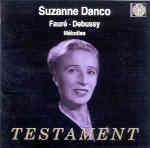Every reissue of Suzanne Danco’s recordings is an occasion for celebration, and this one should make lovers of French mélodies delirious with excitement. While that may seem an oddly heated reaction to a “cool” idiom, if you’re in sync with that corner of the repertoire, you’ll understand. And if you’re not, exposure to Danco may convert you, for she’s an exemplar in the art of French song–a lyric soprano whose pointed, narrow vibrato and bright but sweet timbre was allied to elegant phrasing that gave equal value to both texts and music, a must in a style that marries declamation and song.
The disc opens with Fauré’s La bonne Chanson Op. 61, most often associated with male singers. But except for the first song in the set, Verlaine’s poems aren’t gender-specific–and it wouldn’t matter if they were, given Danco’s glowing, tonally pure account. In “J’ai Presque peur, en vérité” the radiance with which Danco invests the line “Que je vous aime, que je t’aime” typifies the way in which she creates big effects without calling attention to them. Often, on first hearing she can leave an impression of understatement for listeners used to singers who over-emote. Danco’s way, central to the French style, uses tonal coloring and long-breathed legato to intensify emotions within a more restricted dynamic context. So in the lines from “N’est-ce pas?” comparing the two lovers’ hearts beating together to nightingales singing at dusk, Danco charges the music with emotional impact derived from the purity of her tone and her sensitive phrasing.
The rest of the disc is Debussy’s, and it marks Danco not only as a great interpreter of his music but also as a key transition figure between the older Belle Epoque singing style and some of today’s brightest lights. “Green”, the fifth of Debussy’s Ariettes oubliées, illustrates this. Each line ends with a drawn-out extended vocal phrase, carefully observed by Danco, but with changes in vocal color that illuminate the words. Depending on the specifics of the text, she’ll soften the tone, as at “si beaux” in the first stanza, or drain the voice of color, as in “ma fatigue” in the second stanza. But dynamics and tempo are relatively steady alongside the version by Maggie Teyte, whose tempo variations within each line create a more conversational effect. Teyte duplicates Danco’s touching phrase endings but without the vocal purity that makes them so moving.
Similar comparisons in other selections reveal that long-term trend toward a more diffuse international style. The early singers blur the line between declamation and song, Danco tilts toward song while remaining sensitive to textual nuances, and today’s exponents approach the repertoire much as they do works from other national traditions. It’s not one-size-fits-all, but the parameters of interpretive choices are far broader than the stricter stylistic boundaries observed by earlier singers. Thus Clare Croiza, whose complete recordings are available on the Marston label, sings the second of Debussy’s Trois Ballades de Francois Villon in a conversational, almost declamatory way that sounds almost casually understated. Croiza even foregoes the opportunity to make the simple old woman’s joy and fear apparent at witnessing the pictures of paradise and Hell in her parish church, while Danco, again within what now seems like a restricted interpretive context, makes the woman’s emotions vivid.
In “La flute de Pan”, the first of Debussy’s Trois chansons de Bilitis, the wonderful young singer Veronique Gens (EMI) performs the song in a broad, dreamy way that sounds lovely. Danco however, is more the storyteller–conversational, more nasal, coloring the voice in an exquisite blend of questioning and awe in the last line where the narrator sings that her mother will never believe she was out so late just looking for a lost belt. The incomparable Jane Bathori, also on Marston, born a decade earlier than Croiza, completely erases the line between declamation and singing, applies a minimal degree of vocal variety, and, accompanying herself, turns the piano postlude into a mini-song of regret over the character’s lost virginity.
I find such comparisons endlessly fascinating and rewarding. If you don’t, that’s okay. Just get this disc. It’s all about a great singer at the height of her powers in repertoire where she had few equals. She’s ably supported by Guido Agosti’s characterful accompaniments. Don’t be scared off by the mono recording. Everything dates from early 1950s Decca issues engineered with outstanding clarity and transferred brilliantly. Kudos to Testament too, for including full texts and English translations, a must for these textually nuanced songs.
































